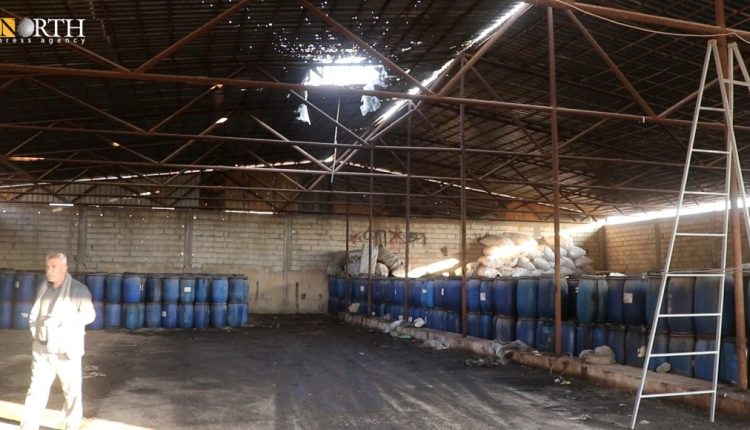
By Samer Yassin/Dilsoz Youssef
HASAKAH, Syria (North Press) – Khalil Alo sadly gazes at the shattered empty barrels, which two weeks ago were filled with olives. The barrels were ready for packaging and selling in the markets. They were, however, bombed by Turkish drone strikes.
Khalil Alo, 54, was displaced in 2018 from the city of Afrin, northwestern Syria, which is occupied by Turkey and Turkish-backed opposition factions, aka the Syrian National Army (SNA). He moved to the town of Amuda in the west of Qamishli city, northeastern Syria. He owns Rohlat Alo Factory for producing canned olives, olive oil, and other products.
Turkish forces targeted infrastructure, service facilities, and small-scale projects in northeastern Syria, including Alo’s factory in late December, 2023.
Over the course of three days, starting from Dec. 25, 2023, Turkey attacked northeastern Syria with airstrikes and artillery shelling, hitting 121 sites with 179 strikes, according to the Monitoring and Documentation Department of North Press.
Recurring losses
Alo owned a similar factory in Afrin, larger in size and greater in production capacity. He left the factory behind along with his house and properties following the Turkish invasion in 2018.
Turkey and SNA factions occupied the city of Afrin and its countryside in March 2018 after a military operation dubbed Olive Branch. The incursion caused the displacement of approximately 300,000 original inhabitants to areas in Aleppo Governorate, northwestern Syria, as well as to the cities of Qamishli and Hasakah and their surrounding areas, in northeastern Syria.
Alo recalled the losses he suffered from the bombing of his factory in Afrin. “Turkey targeted my factory before, causing losses of up to one million in U.S. dollars. I do not know why Turkey targets me,” he wondered.
Alo suffered new losses when his factory in Amuda was bombed. “So far, my losses are estimated at $200,000. It will take over two months to completely clean the factory and sort damaged materials from the rest,” he added.
“In addition, it will take years to recover from this loss, provided we continue working without facing similar incidents again,” he pointed out.
False allegations
Alo established his factory in April 2019 in Amuda under an annual and renewable lease and investment contract with the municipality. He added that he also holds a business license issued by the Syrian government.
Meanwhile, Turkish state-run media outlets claimed that the airstrikes targeted facilities that were funding the Kurdistan Workers’ Party (PKK).
Alo denied that allegation. “This is a civilian factory owned solely by me. It is not associated with any other person, entity, or party. I am a trader selling my goods to all areas in Syria and abroad,” he said.
“Profits from all the goods I sell to any trader in the region are distributed exclusively among me and my workers,” he emphasized.
More than 100 laborers work at Alo’s factory. Despite the losses, he refuses to deprive his employees of their only source of income.
Alo dreads the possibility of further airstrikes against his facility which would mean losing all his fortune and properties. He said that when he established his factory, he believed the area was protected by the Russian and U.S. forces.
“I am constantly worried and haunted by Turkey’s targeting of civilian neighborhoods and areas,” he said.
